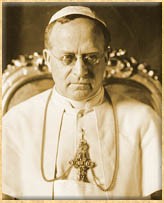 Achille Ratti, like Pius X, had parents who were just plain folks. Born at
Desio on May 31, 1857, he went to the seminary at Milan and then on to the
Gregorian University to take his doctorate in theology. After a few years
in a parish, Father Ratti was put to work at the Ambrosian Library in
Milan. Here he made such a reputation that Pius X in 1912 made him
assistant librarian at the Vatican and soon after head of the great Vatican
Library. Scholar that he was, Ratti was no pale bookworm. He was an
expert, indeed something of a champion, in a difficult and dangerous sport,
mountain climbing.
Achille Ratti, like Pius X, had parents who were just plain folks. Born at
Desio on May 31, 1857, he went to the seminary at Milan and then on to the
Gregorian University to take his doctorate in theology. After a few years
in a parish, Father Ratti was put to work at the Ambrosian Library in
Milan. Here he made such a reputation that Pius X in 1912 made him
assistant librarian at the Vatican and soon after head of the great Vatican
Library. Scholar that he was, Ratti was no pale bookworm. He was an
expert, indeed something of a champion, in a difficult and dangerous sport,
mountain climbing.
In 1918 Benedict XV sent Ratti from his research to serve first as visitor
and then as nuncio to stormy Poland. For a scholar in his sixties to go on
his first diplomatic mission to a country coming to life after over a
century of partition was something of a task. But the old historian
successfully handled a situation perplexing enough to trouble a supreme
court full of Solomons. He showed courage too. When other diplomats fled
before Trotsky's onrushing Red Army, Ratti remained to hear the thunder of
Soviet guns in threatened Warsaw. He had the satisfaction of seeing the
heroic Poles strike back and rout the Communists.
In 1921 Benedict made Ratti a cardinal and archbishop of Milan. A few
months later Benedict was dead and Ratti succeeded him. He chose the
name Pius XI.
Pius XI faced a sadly disturbed postwar world, a world threatened and
tempted by fascism and communism. Far from yielding to discouragement Pius
strove mightily to rally the forces of good and to remedy the times' evils.
To remind a materialistic world of the primacy of the spiritual, Pius
established the beautiful feast of Christ the King. In thirty encyclicals
he shed light on the difficulties of the day. Outstanding were his
encyclicals on education, marriage, and above all, on the social problem.
Though he fought manfully for principle, Pius was quick to extend the hand
of friendship, and his pontificate is notable for a whole series of
concordats. The outstanding event of this kind was, of course, the Lateran
Treaty of 1929, which put a long-desired and satisfactory end to the Roman
question.
Pius XI deeply appreciated the oneness of mankind. He ardently fostered
mission activity and was eager to see native clergy, headed by native
bishops, take over as many mission fields as possible. In what has been
called the Magna Carta of the missions, Pius allowed certain customs which,
once open to superstition, had become secularized with the centuries. He
was keenly interested in the separated Eastern churches and yearned for
reunion with them. His great heart was angered by base attacks on the
Jews, and he bluntly told the world that to be antisemitic was to be un-
Christian. It is characteristic of the man that one of his first acts was
to continue feeding starving Russians in spite of Soviet ingratitude, and
one of his last was to lash out at racist laws.
Pius had much sorrow. He grieved over the sufferings of his children in
Mexico, Russia, Spain, and Germany. But he was not soured. Just before
he died on February 10, 1939, Pius offered his life for the peace of the
world.
Excerpted from "Popes
Through the Ages" by Joseph Brusher, S.J.

